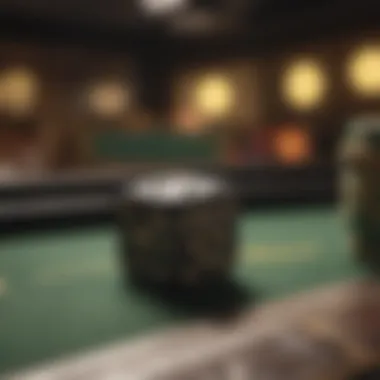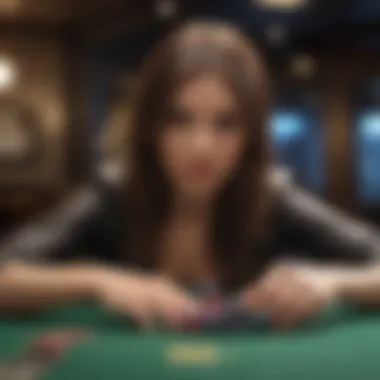Maximizing Wins: Blackjack Strategy with 11


Intro
Blackjack is more than just a game of chance; it’s a nuanced dance of strategy and psychology. When a player holds an 11, the options for gameplay expand significantly due to the potential for a strong hand. This section lays the groundwork for understanding how to leverage that hand. Recognizing when to hit, stand, or double down demands careful analysis of the table dynamics and the dealer’s upcard. As players delve deeper into the intricacies of the game, they can better navigate the complexities of their decisions, ultimately leading to improved outcomes.
Blackjack Strategies
In the world of blackjack, the strategy surrounding an 11 is crucial. The decision-making process can influence the game’s results dramatically. Holding an 11 commonly presents the opportunity to double down. This option allows players to double their wager in exchange for committing to one additional card.
Double Down Dynamics
When considering a double down, a few key factors come into play:
- Dealer's Upcard: The value of the dealer's face-up card is critical. If it is between 2 and 6, the player often holds an advantageous position. However, if the dealer has a 7 or higher, the risks increase.
- Player’s Position: A player in an early position may benefit from knowledge of other players' strategies but must also be cautious of their potential decisions.
"Understanding the timing and context of hitting or standing can mean the difference between winning and losing in blackjack."
Mitigating Risks
While blackjack is a game of strategy, it is also imperative to manage risks effectively. Players must develop a baseline of responsible gambling habits. Setting clear financial limits protects against detrimental losses. Additionally, recognizing the signs of problem gambling can help maintain a balanced approach.
Common Pitfalls
Sometimes strategies can backfire. Be cautious of the following:
- Hitting too many times and risking busting.
- Ignoring basic strategy charts, which display mathematically sound decisions.
- Overestimating one's edge when facing a strong dealer’s hand.
The End
Mastering blackjack requires continuous learning and adaptation. Understanding the strategies associated with playing 11 lays a strong foundation for effective decision-making. By doubling down wisely and managing one's risks, players can navigate the nuances of the game, enhancing their overall experience and outcomes. Further exploration of dealer behaviors can also enrich one’s understanding and mastery of this enduring casino classic.
Preface to Blackjack
Understanding the nuances of blackjack is crucial for anyone looking to enhance their game. This section serves as the cornerstone for comprehending the strategic considerations, particularly when a player holds a total of 11. The regulations, rules, and betting dynamics of blackjack provide a vital framework in which strategic choices are made. By grasping these elements, players can significantly improve their chances of success at the table.
Blackjack is not merely a game of luck; it involves a blend of strategy and probability. Each hand is an opportunity for players to harness their understanding of the game to influence outcomes. Analyzing dealer behaviors, knowing when to hit or stand, and recognizing when to double down are all pivotal decisions that hinge on a player's grasp of the basic principles of blackjack. Understanding these elements will not only sharpen a player's skills but also promote a more enjoyable gaming experience.
The ability to make informed decisions can mean the difference between a winning and losing session. Knowing the fundamentals can elevate your game.
In the following subsections, we will dive deeper into the foundational aspects of blackjack. This includes the card values, how to interpret them, and the essential goal of the game itself. Whether you are a novice player or someone looking to refine your skills, these insights will serve as a valuable resource.
The Value of Cards in Blackjack
In blackjack, the value of cards is not merely a matter of counting but is essential to understanding strategy. Each card holds significance in crafting gameplay tactics, especially when a player holds an 11. The strategy is crafted around responding to card values, which directly influence the choices available during the game.
Card Values and Their Impact on Strategy
In blackjack, the numerical cards carry their face value. Hence, cards two through ten are worth their shown numbers. The face cards—jack, queen, and king—each equate to ten. The ace is special; it can be worth either one or eleven, allowing for greater flexibility in strategy.
When holding an 11, the value of cards becomes critical. The potential to double down means a player can maximize their hand. Doubling down on an 11 against a dealer showing a weaker upcard is a sound strategy. It not only leverages the strength of the hand but also limits losses.
Consider these points regarding card values:
- Flexibility: Holding an 11 offers the option to double down. This is often one of the most favorable positions in blackjack.
- Dealer Vulnerability: Understanding the value of the dealer's upcard can dictate your strategy. For instance, if a dealer shows a 4, they are more likely to bust.
- Risk Assessment: The higher card values decrease the possibility of favorable outcomes when the dealer shows a strong upcard.
In essence, the value of cards guides not just individual play but also strategic decisions that can yield better outcomes.


The Significance of Holding
Holding an 11 in blackjack is significant as it presents a favorable position. This hand often acts as a pivot point for strategy, especially when considering options like hitting, standing, or doubling down. The ability to double down is crucial; it effectively doubles the bet when the odds favor the player.
"The most advantageous plays often arise when the player's hand totals to 11, setting the stage for decision-making rooted in both risk and reward."
What makes holding an 11 advantageous?
- Strong Starting Point: An 11 offers a substantial opportunity to achieve 21 if the next card is a ten.
- Strategic Doubling: This hand encourages aggressive betting through doubling down, which can lead to higher payouts.
- Pressure on Dealers: When the player shows an 11, dealers may be prompted to adjust their strategies, especially if their upcard is weaker.
Optimally, when holding 11, a player should evaluate dealer patterns and outcomes. The hand encourages taking calculated risks, but the decision should always be informed by the cards in play.
In blackjack, every card carries weight, and understanding the value of 11 can drastically influence game outcomes. It leads to strategic decisions, positioning the player ideally against dealer's potential moves.
Probabilities in Blackjack
Understanding probabilities is crucial in blackjack, especially when a player holds an 11. This strategic component can greatly influence decision-making and potential outcomes during gameplay. Focusing on specific calculations can provide significant insights into win rates, losses, and overall strategies. Players who engage with probabilities often find they can make more informed choices, reducing emotional decision-making that might lead to costly errors.
Probabilities offer players a framework to approximate the likelihood of various outcomes based on dealer upcards and player hands. Evaluating these probabilities enhances the player’s ability to adjust their strategy, maximizing wins while minimizing losses. This analytical approach is vital in gambling, as it creates a balanced perspective in an otherwise chance-oriented environment.
Statistical Analysis of Against Dealer Upcard
When holding an 11, understanding the statistical interaction between your hand and the dealer's upcard becomes essential. The probabilities show that you stand a strong position, particularly against certain dealer upcards. For example, when the dealer shows a low card, such as 2 through 6, the probability of them busting increases. Conversely, a dealer with a 10 or ace shows a stronger hand potential.
Let's dive into key points:
- Player Holding 11: The hand value is optimal for significant action, especially doubling down.
- Dealer's Upcard: If the dealer presents a weak upcard (2 to 6), the player should consider aggressive strategies.
- Busting Chances: If the dealer shows a 7 through ace, the player must exercise caution since the odds can shift against them.
Incorporating statistical principles helps players understand when to take risks and when to play conservatively. Understanding these probabilities allows for making data-driven decisions rather than purely speculative moves.
Expected Outcomes of Doubling Down
Doubling down when you hold 11 is often regarded as one of the best plays in blackjack, particularly with favorable dealer upcards. The expected outcome hinges on understanding risk versus reward. By doubling down, a player commits to betting an additional amount while receiving only one more card.
The outcomes can be summarized as follows:
- Favorable Scenarios: If the dealer upcard is 2 to 6, the player's chance of receiving a 10 or face card significantly enhances their winning potential.
- Less Favorable Outcomes: If the dealer's upcard is higher, like a 10 or ace, the player should carefully consider their doubling decision, as the risk of losing increases.
In blackjack, informed decision-making is key. By engaging with both statistical analysis and understanding expected outcomes, players can refine their approach, optimizing chances for success.
Basic Strategies for Playing
The strategy of playing an 11 in blackjack is crucial for maximizing potential gains. Holding an 11 is often considered one of the most favorable positions in the game. This section delves into essential strategies that can empower players to make informed decisions, enhancing their overall gameplay. Understanding when to hit or stand, as well as the opportunity to double down, are key elements that can define success.
Every action taken has its own set of benefits and considerations, making it vital to comprehend the strategic landscape when holding an 11.
When to Hit or Stand
When a player holds 11, deciding whether to hit or stand is significant. The general recommendation is to hit if involved in a scenario where the dealer shows a strong card, such as a 10 or an Ace. Conversely, standing can be more favorable when the dealer's card is weak, like a 5 or a 6.
Here are specific situations:
- Hit Against Strong Dealer Cards: If the dealer's upcard is a 10 or Ace, hitting can present a way to potentially form a higher hand total, as the risk of the dealer reaching a strong position is considerable.
- Stand Against Weak Dealer Cards: When facing a dealer card like 5 or 6, standing can take advantage of the dealer's likelihood of busting.
"Understanding when to hit or stand can make a significant difference in the outcome at the blackjack table."
Choosing correctly can protect against the dealer’s strong hand and can also capitalize on their weaknesses.


The Role of Doubling Down
Doubling down is often an optimal strategy when a player holds an 11. This option allows the player to double their initial bet after receiving the first two cards, in exchange for committing to receive only one more card.
Here are some considerations for doubling down with an 11:
- Statistical Advantage: Doubling down on an 11 gives players an excellent chance of achieving a total of 21, especially with the potential of drawing a face card or a 10.
- Dealer’s Upcard Influence: Doubling down is particularly recommended when the dealer shows a weak card, as it positions the player to take full advantage.
In such cases, maximizing gains when the odds seem favorable is an effective strategy. Players need to act confidently but also remain mindful of the dealer's hand.
Dealer Behavior and Player Decisions
Understanding the interaction between dealer behavior and player decisions is crucial for maximizing your strategy in blackjack, particularly when you hold an 11. BlackJack is not just about chance; it also involves calculated decisions based on the dealer’s actions. Players need to pay attention to the dealer’s upcard because it significantly affects the possible game outcomes. This can help you make informed choices, whether you decide to hit, stand, or double down. Recognizing the patterns and tendencies of dealers can lead to more successful gameplay.
Understanding Dealer Upcard Metrics
The dealer's upcard can greatly influence your decisions when holding an 11. The upcard represents the dealer's potential strength and gives you crucial information. Here’s a breakdown of how to evaluate this:
- Card Value: Cards 2 through 6 are considered weak for the dealer, while cards 7 through Ace are stronger. When the dealer shows a weak card, the player holding 11 usually has an advantageous position.
- Player Strategy: Holding an 11 against a dealer's weak card (2-6) is often a strong position for doubling down. Conversely, if the dealer shows 7 through Ace, it’s essential to consider hitting instead.
- Dealer Bust Potential: Analyzing the dealer's upcard also involves understanding bust probability. Dealer’s showing low cards tend to bust more frequently than those with Aces or 10s. Hitting against a strong upcard may result in higher risk.
"A dealer showing a low card often creates a better chance for the player, allowing for a strategic advantage in decision-making."
Adapting Strategy Based on Dealer Position
Adapting your strategy according to the dealer's position is vital in blackjack. Here’s how you can implement practical changes based on different scenarios:
- Standing Against Weak Cards: When the dealer shows low cards, you might choose to stand after achieving a total of 11 if you believe the dealer will bust.
- Doubling Down: If the dealer shows a weak upcard, doubling down can be a savvy move. This is an opportunity to increase your potential payout with lower risk involved.
- Hit on Strong Dealer Upcard: If the dealer's upcard is 7 or higher, your optimal strategy often involves hitting to increase your total closer to 21.
Common Pitfalls When Playing
Understanding the common pitfalls when playing an 11 in blackjack is crucial for a player’s success. Holding an 11 presents a unique opportunity, particularly because of the potential to double down. However, many players make errors that can significantly hinder their performance. This section explores critical misconceptions and emotional biases that can undermine effective decision-making.
Misconceptions About Doubling Down
Doubling down is one of the most powerful tools in blackjack, particularly when holding an 11. A common misconception is that this action guarantees a win. While it increases the potential payout, it does not secure a favorable outcome. Players often forget the basic mathematical concept that doubling down on 11 should primarily depend on the dealer’s upcard.
Players should evaluate the dealer’s card before deciding to double down. If the dealer shows a weaker card, such as a 4, 5, or 6, it is generally more advantageous to double down. On the other hand, when faced with a stronger card, the decision to double down may not be wise. Also, a frequent error is believing that doubling down is always the best choice with an 11. Assessing the overall game context is necessary to avoid falling into this belief. This critique creates a more informed approach.
"Doubling down on an 11 can yield higher returns but not without strategic assessment."
In summary, players must prioritize context and dealer behavior over the allure of doubling down. This understanding not only helps in making more calculated bets but also enhances the overall strategy.
Emotions vs. Strategy in Decision Making
Emotions play a substantial role in gambling, often leading to decisions that stray from optimal strategy. Players holding an 11 may feel the excitement or pressure of potential wins, causing them to make impulsive choices. Understanding this psychological aspect is essential.
Many players allow emotions to influence their hands. For example, frustration from a series of losses may lead to reckless plays. Instead of adhering to the fundamental strategy associated with an 11, emotional players might hit when they should stand or vice versa. This inconsistency can easily result in unnecessary losses.
Additionally, overconfidence can arise from the initial success of playing an 11. A player might wrongly assume they can consistently make the right calls. This arrogance can lead to miscalculations, particularly when faced with the dealer's potential to bust. Maintaining a calm mindset is vital before making each move.
Advanced Strategies for Experienced Players
In blackjack, reaching a proficient level requires a firm grasp of advanced strategies. This is especially true when one holds an 11. At this total, players frequently encounter crucial decisions that can maximize their advantages against the dealer. Advanced strategies venture beyond basic rules, addressing the nuances that can elevate a player’s success.
Understanding advanced strategies involves recognizing the importance of situational awareness and statistics. These strategies enable players to analyze probabilities more effectively and adapt their gameplay accordingly. The benefits include a higher win rate and the ability to manage one’s bankroll with greater precision. Considerations for advanced strategies include the player's understanding of the game's mechanics and their comfort level with risk.


Card Counting and Its Application
Card counting stands out as a pivotal technique in the arsenal of advanced blackjack players. This method tracks the ratio of high cards to low cards remaining in the deck. By doing so, players can adjust their betting and playing strategies based on the likelihood of favorable outcomes.
The basic principle is simple: when there are more high-value cards left in the deck, the player's chances of hitting 21 increase. Conversely, if low cards dominate, the player's risk of busting rises. For effective card counting, here are fundamental steps:
- Assign values: Assign values to cards; typically, 2-6 are valued as +1, 7-9 as 0, and 10-Ace as -1.
- Maintain a running count: Keep a mental tally of the values as cards are played.
- Calculate the true count: Adjust the running count based on the number of decks in play.
- Bet strategically: Increase bets when the true count indicates favorable conditions.
While card counting is not foolproof, when executed effectively, it provides a substantial edge. Players must remember, however, that casinos often watch for excessive card counting and may take action against those who employ it.
Game Variations and Adaptive Tactics
Another facet of advanced strategies is recognizing and adapting to various blackjack game variations. Each variant has different rules and payout structures that impact strategy. Recognizing these variations allows players to tailor their play style, improving overall chances of success.
Common game variations include:
- European Blackjack: Often played with fewer decks. This requires tweaking strategies when the dealer stands on soft 17.
- Atlantic City Blackjack: Handles specific rules for the dealer and may allow for late surrender, impacting the player's strategy decisions.
- Vegas Strip Blackjack: Has its own set of unique rules that may favor players depending on the specific table conditions.
Adaptive tactics involve adjusting strategies based on the dealer’s behavior and a player’s position at the table. For example, if a dealer's upcard shows a vulnerable number, like 4, 5, or 6, players may shift to a more aggressive betting approach while holding an 11. Understanding these dynamics not only enhances decision-making but also fosters a more nuanced approach to gameplay.
Emotional and Psychological Aspects of Gambling
Understanding the emotional and psychological dimensions of gambling is crucial, particularly in games like blackjack where strategic decisions can be swayed by an individual’s mindset. For players holding an 11, maintaining mental control is as important as knowledge about statistical probabilities and strategic play. This section delves into the significance of emotions in gambling and how they affect gameplay, decision-making, and overall enjoyment.
Maintaining Composure in High-Stakes Situations
In high-stakes environments, players are often under substantial pressure. Maintaining composure during these moments is vital. When playing blackjack, especially with an 11, players face crucial decisions that will impact their chances of winning. Stress can lead to rash decisions, such as hitting recklessly or not doubling down when logically advised. Here are some considerations that can help players stay calm:
- Deep Breathing: Simple breathing exercises can significantly alleviate anxiety.
- Preparation: Understanding the rules and strategies before sitting at the table can boost self-confidence.
- Set Limits: Establishing financial limits helps prevent emotional distress related to losses.
By implementing these techniques, players can improve their decision-making process and better navigate the emotional highs and lows of the game, ultimately enhancing their gaming experience.
Understanding Risk Perception in Gambling
Risk perception in gambling plays a pivotal role in how players engage with the game. It influences not only how players evaluate situations but also how they assess potential outcomes when holding an 11. Different players have varying levels of comfort with risk, which can affect their strategic choices. Here are some key points concerning risk perception:
- Individual Experience: Players with more experience may have a better understanding of probabilities and thus a different view on risk compared to novices.
- Peer Influence: Observing other players can alter risk perception, either increasing or decreasing an individual’s willingness to take certain actions.
- Cognitive Biases: Common biases, such as the illusion of control, can lead players to overestimate their ability to influence the outcome of the game.
By understanding their own risk perceptions, players can make more informed decisions that align with their overall strategy. Recognizing how emotions and psychology play into gameplay provides players a more rounded perspective and better prepares them for the challenges of blackjack.
"Gambling is not merely a game of chance; it is also a display of psychological endurance."
Considering these aspects can significantly improve a player's experience and success in blackjack, particularly when managing the complexities of making decisions with an 11.
The End
Understanding how to play 11 in blackjack holds significant importance for both new and experienced players. It allows individuals to capitalize on the statistical advantages present in this game. Playing an 11 provides unique opportunities, especially when considering the strategies of hitting, standing, or doubling down.
Recapitulation of Key Strategies
Players need to focus on several key strategies when holding an 11:
- Doubling Down: This is often the best move when the dealer shows a weak upcard. Doubling down allows players to maximize their winnings under favorable conditions. When the dealer reveals a card such as 4, 5, or 6, it opens a pathway for players to significantly increase their bet while maintaining a strong position.
- Hitting or Standing: If players face a dealer's strong card, opting to hit could lead to more potential wins. However, standing is typically advantageous when conditions appear favorable for the player’s hand.
- Adjusting to Dealer’s Strategies: Understanding dealer behaviors can influence the player’s decisions. Players need to pay attention to the dealer’s upcard and adjust their strategy accordingly, such as hitting against strong dealer cards while standing against weaker ones.
Future Considerations in Blackjack Education
The landscape of blackjack is constantly evolving. Players must stay informed about new strategies and comprehensive game analyses.
- Learning Resources: Players should utilize various resources such as online articles, forums on sites like reddit.com or pages like britanica.com. These platforms can provide insights into advanced strategies and current trends that may impact gameplay.
- Practice Through Simulation: Online simulations and apps can improve one’s skill without financial risk. Getting accustomed to various situations, such as holding 11 against different dealer upcards, enhances decision-making abilities in real games.
- Mental Preparedness: Gambling education should also cover psychological factors. Understanding emotional control can significantly impact a player’s strategies and overall decision-making.
"In blackjack, the decisions made when holding 11 can define the outcome of your game. Knowledge and adaptability are crucial."
By recapping key strategies and emphasizing future educational considerations, players can enhance their approach to blackjack. The combination of strategic understanding and psychological awareness is essential for consistent success in the game.















